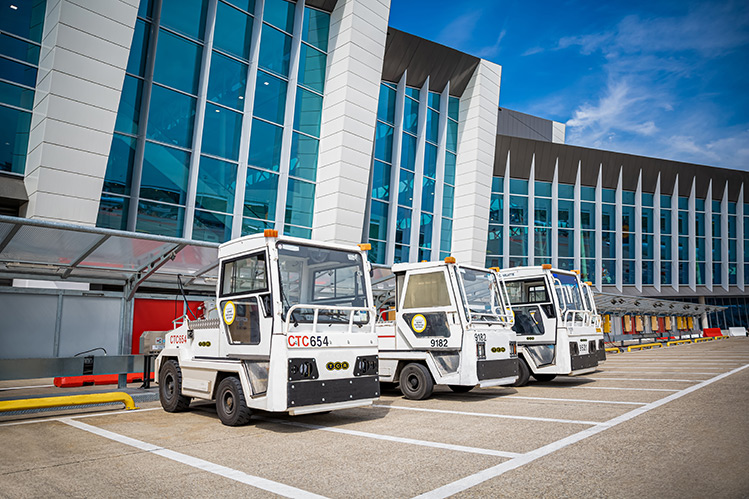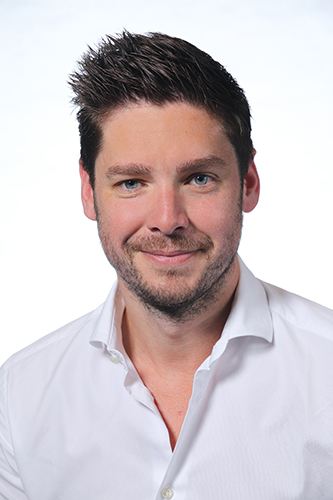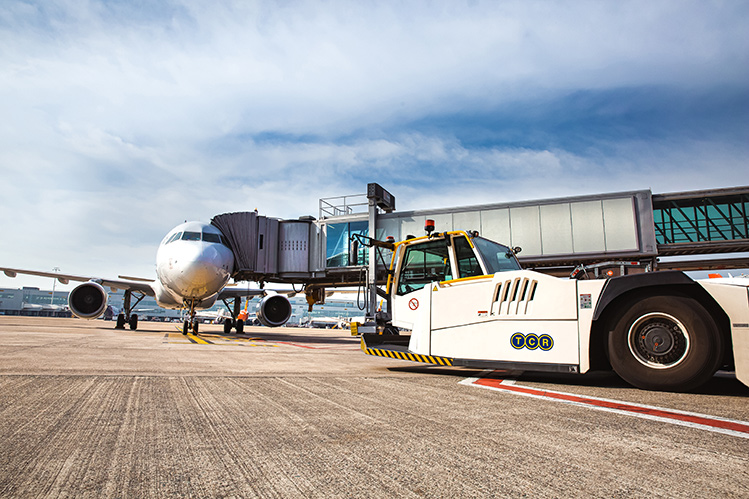An interview with Kristof Philips, Chief Operating Officer, TCR Group. By Ross Falconer
TCR Group provides ground support equipment (GSE) to airports, airlines, ground handlers and cargo handlers, and currently operates at 150+ airports worldwide. Its objective is to work together with airports and their stakeholders to optimise fleet size and use for safer, sustainable and more efficient airport operations. This includes providing the optimal equipment and maintenance, technology-driven management systems, and strategic advice to meet airports’ GSE needs.

TCR has developed a framework known as the ‘Apron Trilemma’, which has three core elements: Continuity of the operation, Affordability of the operation, and Sustainability of the operation.
“We recognise that the world is changing, and we face new and emerging challenges and increased expectations from stakeholders and global communities,” says Kristof Philips, Chief Operating Officer, TCR Group. “We are committed to continually evolving and ensuring we operate and grow our business, and those of our customers, responsibly and sustainably. As most of our operations take place inside airports, our ambition is to collaborate with our partners – airports, airlines and handlers – in addressing sustainability issues such as noise, air quality, biodiversity and water management, and also more global environmental issues – particularly the aviation industry’s greenhouse gas and carbon emissions.”
The ‘Apron Trilemma’

Kristof Philips, Chief Operating Officer, TCR Group: “As most of our operations take place inside airports, our ambition is to collaborate with our partners – airports, airlines and handlers – in addressing sustainability issues such as noise, air quality, biodiversity and water management, and also more global environmental issues – particularly the aviation industry’s greenhouse gas and carbon emissions.”
Over 200 of Europe’s airports have committed to a ‘Net Zero 2050’ pledge, under which they plan to eliminate the carbon footprint under their control at the latest by 2050. “This could save up to a potential 3.5 million tonnes of CO2 annually,” Philips explains. “This is a big challenge – it’s clear that a lot of investment will be required. For example, some estimates are that €26 billion would be required to make the aprons and the terminals more energy-efficient. We feel that TCR can help a lot, especially considering 15% of Scope 1 and Scope 2 emissions are linked to airport ground vehicles. We feel that as an integrator between all the airport stakeholders we are well-positioned to support the journey towards net zero emissions.”
He adds that there is still a long and difficult road ahead in order to achieve these ambitious targets. TCR has, therefore, developed the ‘Apron Trilemma’ as a framework to implement change. This has three core elements: Continuity of the operation, Affordability of the operation, and Sustainability of the operation.
TCR also looks at sustainability from the point of view of safety, ensuring that the apron as an ecosystem is sustainable and safe.
In terms of ‘Continuity’, Philips emphasises that in an airport environment everything must run smoothly and continuously.
Finally, there is the concept of ‘Affordability’ and achieving the objectives in an affordable way for all stakeholders.
When it comes to mapping a solution against the ‘Apron Trilemma’, Philips notes that different stakeholders may have different priorities in terms of emphasis. It is here that TCR aims to become the facilitator and Philips highlights the importance of defining “a holistic and phased implementation plan involving all stakeholders using factual data”.
The tools that TCR frequently uses in its engagement include:
- Infrastructure and fleet sizing tool and data: “We look at the flight schedule, how much equipment is required, and how that translates into infrastructure requirement in terms of charging capacity.”
- Operational activity tool and data: “We gather this through our Telematics solution, which allows us to have a good view of where the equipment is, how it’s being used, who is using it, and for electric equipment what the charging status is. This is crucial to be able to manage a fleet optimally.”
- Carbon footprint and fuel consumption data: “We have a tool to map the carbon footprint and fuel consumption of a fleet moving around on the apron.”
- Independent partnerships: “We have a lot of independent partnerships and this is very important because it allows us to connect with all types of OEMs to be able to sort out the best solution for an airport, airline or handler.”
- Routing and congestion data: “This allows us to really have a good view of how a fleet is moving on an apron, which is important in terms of safety.”
- Accident data: “In order to generate a safe and continuous apron, we really wanted to know if an incident occurs, how did it happen and how can we avoid it again going forward.”
In light of the European Green Deal, TCR has accepted to partner with various major airports, airlines and infrastructure companies to further investigate electrification and hydrogen solutions. “Key in these projects is to keep in mind the ‘Trilemma’ and how we make sure this solution is affordable, sustainable and guarantees continuity,” says Philips.
An example of the projects TCR is participating in is the ‘Basque Hydrogen Corridor’ – a €1.3 billion hydrogen project led by Petronor.
Motorised pooling case
TCR implemented the ‘Apron Trilemma’ framework at London Luton Airport. Philips explains that a phased and holistic approach was applied. This involved defining zones and sizing of the fleet, aligning stakeholders with equipment specifications, defining the responsibilities of each stakeholder, and determining the allocation/invoicing method.
“The phased implementation approach led to very strong results, with benefits to all stakeholders – the airport, the handlers and the airlines, as well as the passengers,” says Philips. “We were able to significantly reduce congestion and turnaround times with the pooling implemented.”
TCR believes that making an assessment is one thing, but having the ability and the desire to implement together with the stakeholders is even more important.
“We want to step away from a theoretical and conceptual assessment and use our knowledge and experience in implementing practical solutions,” says Philips. “Going for sustainability is not a project as such, it’s a journey and something that takes time. If you see it as a journey, then you can define milestones and digestible steps. It is these steps that you can manage as a project and we invite all stakeholders to embark on this journey.”








